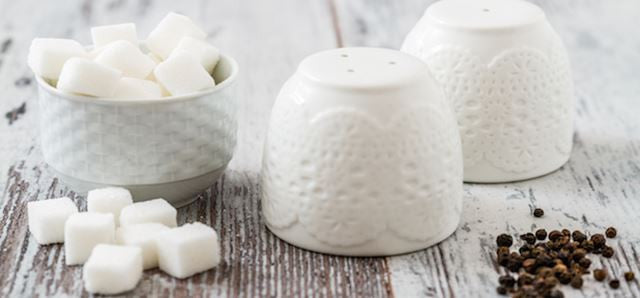1. The Perils of Salt

A pinch of salt is one of our favourite seasonings to add or enhance flavour to a meal. It’s also what makes high-salt food, like potato chips and salted peanuts, so deliciously addictive. But what is all this salt really doing to our bodies? Whilst there are a number of other contributing factors, a high salt diet can raise your blood pressure, which can lead to a heart attack and stroke. Too much salt can also cause you to retain water, so those complaints of feeling uncomfortably bloated after a few a salty meals are totally justified. These factors make cutting down on the salt sound much more appealing than that second handful of chips.
However, not all salt is created equal. Normal, refined table salt lacks the nutrients contained in unrefined sea salt. Table salt goes through a refining and bleaching process which removes many naturally occurring trace minerals found in sea salt. Eating too much refined salt tends to cause fluid to accumulate in tissues which can lead to arthritis, gout, kidney and gall bladder stones and high blood pressure.
2. The Perils of Sugar

Oh sugar! How can anything so sweet be so bad for us? It’s usually the main ingredient in the tasty morsels we reward ourselves with. We’re the first to admit, it’s hard to avoid the temptation of sugar, especially when we’re feeling stressed. Whilst occasionally treating yourself to something a little sweet is fine, indulging in too many guilty pleasures can pose many serious health risks.
When we think of sugar, we think of chocolate and cakes, but there are also less obvious sugars and that’s what makes it dangerous. Fructose is often hidden in foods where you wouldn’t expect it - like packet sauces and fruit juice. Excess fructose is a big factor in contributing to ill health because it can only be metabolised by the liver and can’t then be used for energy by your body’s cells. Because the body can’t use fructose, it gets transformed into fat.
As well as weight gain, excess sugar increases insulin levels, which activates the sympathetic nervous system. This can then lead to an increased heart rate and blood pressure. Excess sugar also causes inflammation of the arterial walls, which over time can lead to heart disease and stroke. Check out the trailer for “That Sugar Film” to learn more about the harmful effects of sugar – especially in those hidden sources.
3. The Beauty of Balance

Don’t worry, it’s not all negative. In fact, our bodies do rely on both salt and sugar for a number of vital functions after all.
Salt is important for some of your body’s essential functions, like nutrient absorption and transport. When salt breaks down in the body, each part becomes an important player - either in the digestive tract to absorb nutrients from food, or influencing liquids retained by the body to help regulate blood volume and pressure.
Sugar actually refers to any number of simple carbohydrates like glucose, fructose and sucrose. During the digestive process, most carbohydrates break down into these sugars, which become energy that fuels your body. It’s just important to try and stay away from too many of the hidden sugars your body can’t process very well, like fructose.
4. Salt vs. Sugar

Which is the real antagonist to the health and wellbeing of our body? Some studies say that sugar consumption is even worse for cardiovascular health than salt, but other results state that too much salt is far worse for blood levels and heart disease than sugar.
So while there is still a debate over which is indeed worse for our health, the fact of the matter remains that in excess, both are bad and too much of either will not benefit your health.
5. Reducing your Intake

Sure, there’s a lot of focus on sugar and salt, but it’s important to be reasonable in your approach. After all, our bodies do need both of them to function. The best advice is to be aware of the type and quantity of sugar and salt that you are consuming . It’s important to eat real, whole food – choosing foods in their most natural form will be automatically lower in sugar and salt than their processed alternatives.
The current guidelines suggest that we should not consume more than one teaspoon of salt per day. Instead of adding extra salt to your dishes, try enhancing the flavour by adding more herbs and spices and choosing fresh meat instead of processed meat (like sausages, for example) which tend to have a higher salt content.
For sugar, the guidelines are:
- Men: 9 teaspoons - the equivalent of two large bananas or two medium apples.
- Women: 6 teaspoons - the equivalent of 1.5 large oranges or a large apple.
- Children: 4 teaspoons - the equivalent of one large banana or nearly one medium apple
This may sound easy to stick to, however, a typical 250ml glass of fruit juice can contain up to 7 teaspoons of sugar on its own! If you’re craving something sweet, reach for a piece of fruit. It’s better than juice because it hasn’t been processed and still retains vitamins, minerals and fibre. If you do find your willpower is a bit weaker when it comes to resisting sugar, there are natural supplements like Sugar Stop that are specially formulated to help reduce those cravings.
When it comes to salt versus sugar, the debate is still open on which is the least evil. Not only is it related to how much you consume but also the different types. Our bodies require the presence of both salt and sugar to function, but we could all benefit from adjusting our habits, eating a less processed diet and being more mindful of the impact of our diet and lifestyle choices on our bodies.







